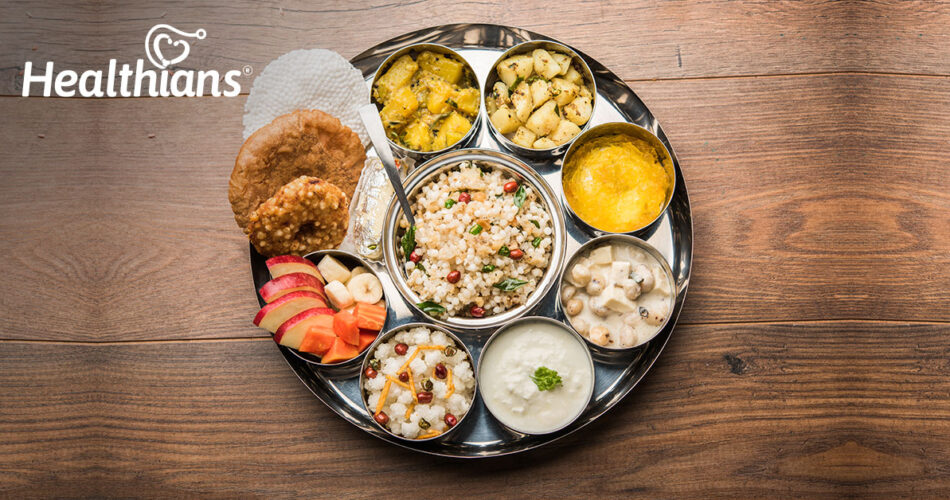Contributed by: Healthians Team
Introduction
Fasting for Shardiya Navratri will start today September 26 and end with Kanya Pujan on Navami on 4th October 2022. Many devotees of Goddess Durga fast during the whole nine days, while others only do so on the first two and last two days.
People from different parts of the country follow various rituals to celebrate Navratri, and the ceremonies vary significantly depending on the culture.
Navratri is primarily a time of fasting in North India, whereas the event is associated with big Durga Puja pandals, dhunuchi naach, and sindoor khela in West Bengal and Gujarat. Navratri is observed as Bommai Golu in South India, when people display lovely golu dolls in their homes for nine days.
In this blog, we will know about the tips to make Navratri Fasting healthy this year.
What is Navratri fasting?
During Navratri, the devotees worship the nine forms of Maa Durga for nine days and observe a fast to appease the Goddess.
Here are some key points to keep in mind while fasting this Navratri:
- Wake up early and take a bath
- A person who is fasting should abstain from consuming alcoholic drinks or tobacco.
- People can consume kuttu, singhara, sabudana, samak, milk and fruits while observing their partial fast.
- Mustard oil and sesame must be avoided. However, you can use peanut oil or ghee as an alternative.
- One should not consume processed salt during Navratri and use sea salt as an alternative.
The benefits of fasting during Navratri
It is medically proven that fasting has many mental and physical health benefits. Let us take a closer look at some of the benefits of fasting during Navratri:
Body cleanser: Fasting reignites the body’s natural need to digest food. This also aids in the body’s detoxification and removal of pollutants. Additionally, it aids in lowering the body’s sluggishness and dullness.
Meditation: As the mind becomes less agitated during a fast, focusing on meditation and quieting the body becomes simpler.
Reflection: Navratri is also a time to unwind, take a breather, and express gratitude for the people and joy in our lives. Fasting assists in calming the body and lessens mental agitation.
Fill the fasting with Fresh fruits and vegetables: In order to avoid falling sick during fasting, it is crucial to include fresh fruits and vegetables in your diet.
Tips for healthy Navratri fasting to stay energised
- Fresh fruits and vegetables should continue to be a part of a healthy diet. Keep yourself hydrated throughout the fast. To make up for the nutrients lost during the fast, eat juices and coconut water. You’ll remain invigorated as a result of your increased fluid consumption.
- Be sure to get six to eight hours of sleep at night and a 15 to 30-minute nap during the day. Between the preparations and the celebrations, remember to take a nap. For your body to be energised and active, it needs to sleep.
- To give the body the necessary nutrients that will keep it energetic, you may combine high-carb meals like potatoes and sabudana with fibre vegetables like cabbage, tomatoes, capsicum, bottle gourd, etc.
- During the Navratri fast, you will not get protein or carbohydrates in your diet, but you may make up for it by eating Kuttu-based pooris and rotis. Kuttu Atta mainly known as Buckwheat is a flour that is consumed widely in India during fasting.
- You can include samak rice in your diet together with vegetables.
- You might occasionally desire to indulge in sweets, however, commercially available artificial sugars or sweets might not be permitted when you’re fasting. Consume fruits, apple kheer, samak rice kheer, raita, almonds, raisins, or walnuts to satiate your desires.
- Substitute jaggery or honey for refined sugar in your dishes to avoid using this harmful component.
- To maintain healthy blood pressure levels and aid the body in absorbing more minerals, add rock salt or sendha namak in your dishes when cooking.
- Avoid overeating root vegetables. A lot of individuals add root vegetables to their diets, such as potato, yam (jimikand), sweet potato, pumpkin, and arbi (Colocasia root).
These vegetables are starchy and packed in fibre, minerals, and B vitamins. However, they provide you with many calories, so limit your intake.
Final thoughts
Navratri fasting, when done correctly, has various physical advantages in addition to its spiritual component. Studies have demonstrated how fasting affects weight reduction and fat loss.
Limiting food intake may promote mental health while preventing chronic conditions including high cholesterol, heart disease, and high blood pressure.
During the hours of fasting, our bodies are in a state of rest. This tells our digestive system to begin the body’s detoxification process and clean our stomach.
Furthermore, you should also undergo preventive health checkups. These health checks give a complete report about your health, allowing you to take necessary precautionary measures to improve your well-being and keep a host of ailments at bay.
Book The Full Body Good Health Test Today!




